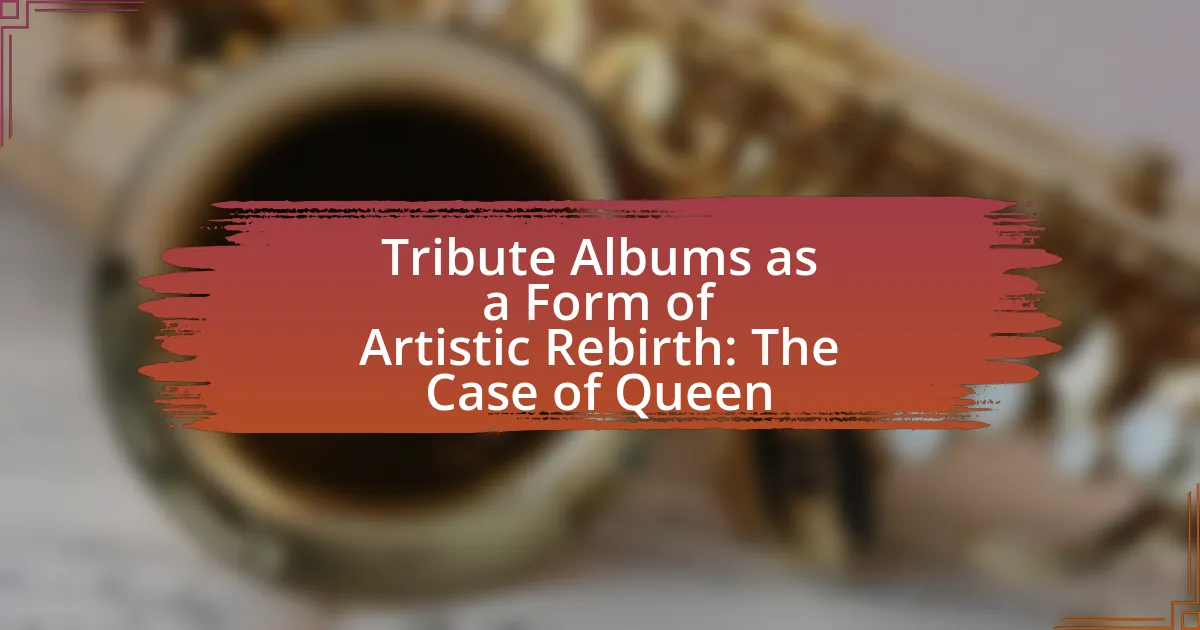The article explores the significance of tribute albums dedicated to Amy Winehouse, highlighting their cultural and emotional value in honoring her legacy and influence on contemporary music. It examines how these albums reflect the emotional impact of her work, the common themes of loss, love, and resilience, and the ways artists reinterpret her unique style. Additionally, the article discusses the role of tribute albums in preserving Winehouse’s legacy, their emotional resonance with listeners, and the critical reception they receive, ultimately emphasizing their importance in the ongoing conversation about her artistry and influence in the music industry.

What is the significance of tribute albums for Amy Winehouse?
Tribute albums for Amy Winehouse hold significant cultural and emotional value as they honor her legacy and influence on contemporary music. These albums serve as a means for artists to express their admiration and respect for Winehouse’s unique style and artistry, often featuring reinterpretations of her iconic songs. For instance, the tribute album “Amy: The Original Soundtrack” includes various artists covering her tracks, which not only showcases her impact on the music industry but also keeps her memory alive for new generations. The emotional resonance of these albums reflects the profound connection fans and musicians have with Winehouse’s work, emphasizing her lasting influence on soul and jazz music.
How do tribute albums reflect the emotional impact of Amy Winehouse’s music?
Tribute albums reflect the emotional impact of Amy Winehouse’s music by showcasing the deep connection artists have with her work and the themes of love, loss, and vulnerability present in her songs. These albums often feature reinterpretations of her tracks, allowing other musicians to express their personal experiences and emotions related to Winehouse’s poignant lyrics and soulful melodies. For instance, the tribute album “Amy: The Original Soundtrack” includes various artists who convey their admiration and sorrow through their renditions, highlighting how her music resonates with universal feelings of heartache and longing. This collective homage underscores the lasting influence of Winehouse’s artistry and the emotional landscape she created, demonstrating how her music continues to inspire and evoke strong feelings in both artists and listeners alike.
What themes are commonly explored in tribute albums dedicated to Amy Winehouse?
Tribute albums dedicated to Amy Winehouse commonly explore themes of loss, love, addiction, and resilience. These themes reflect Winehouse’s own struggles and experiences, particularly her battles with substance abuse and tumultuous relationships, which are often mirrored in the emotional depth of the covers and reinterpretations of her songs. For instance, many artists pay homage to her legacy by addressing the pain of heartbreak and the complexities of love, as seen in tracks like “Back to Black.” Additionally, the theme of resilience is highlighted through the celebration of her artistry and the impact she had on music, emphasizing her influence on contemporary artists and the ongoing conversation about mental health and addiction in the music industry.
How do artists interpret Amy Winehouse’s style in their tributes?
Artists interpret Amy Winehouse’s style in their tributes by emulating her distinctive blend of jazz, soul, and R&B, often incorporating her signature vocal techniques and emotional depth. For instance, many tribute performances highlight her raw, confessional songwriting and the unique phrasing that characterized her music, reflecting her personal struggles and triumphs. Additionally, artists frequently pay homage to her iconic fashion sense, which included beehive hairstyles and vintage clothing, further capturing the essence of her persona. This multifaceted approach not only honors her musical legacy but also resonates emotionally with audiences, as seen in tribute albums and live performances that aim to recreate the authenticity and passion she brought to her work.
Why are tribute albums important in preserving Amy Winehouse’s legacy?
Tribute albums are crucial in preserving Amy Winehouse’s legacy because they celebrate her unique artistry and emotional depth, ensuring her music continues to resonate with new audiences. These albums often feature various artists interpreting her songs, which not only honors her influence but also introduces her work to listeners who may not be familiar with her original recordings. For instance, the tribute album “Amy: The Girl Behind the Name” includes diverse artists who reinterpret her iconic tracks, showcasing her lasting impact on contemporary music. This collective remembrance reinforces her significance in the music industry and keeps her spirit alive through ongoing cultural conversations about her contributions.
What role do tribute albums play in the music industry?
Tribute albums serve as a means to honor and celebrate the legacy of influential artists within the music industry. They provide a platform for contemporary musicians to reinterpret and pay homage to the original works, thereby keeping the artist’s memory alive and introducing their music to new audiences. For instance, the tribute album “Amy” released in 2015 featured various artists covering Amy Winehouse’s songs, which not only showcased her impact on music but also highlighted the emotional connection her work continues to evoke. This practice can also generate revenue for the original artist’s estate and contribute to charitable causes, further solidifying the cultural significance of tribute albums in preserving musical heritage.
How do tribute albums contribute to the ongoing conversation about Amy Winehouse’s influence?
Tribute albums contribute significantly to the ongoing conversation about Amy Winehouse’s influence by showcasing the enduring impact of her music on contemporary artists. These albums often feature a diverse range of musicians who reinterpret Winehouse’s songs, highlighting her unique vocal style and lyrical depth. For instance, the tribute album “Amy: The Tribute” includes various artists who pay homage to her work, reinforcing her status as a cultural icon. This collective recognition not only celebrates her artistry but also sparks discussions about her influence on genres such as soul, jazz, and pop, illustrating how her legacy continues to inspire new generations of musicians.

What emotional responses do tribute albums evoke in listeners?
Tribute albums evoke a range of emotional responses in listeners, including nostalgia, sadness, and appreciation. These emotional reactions stem from the listeners’ connections to the original artist and their music, often intensified by the context of loss or remembrance. For instance, tribute albums for Amy Winehouse elicit feelings of longing and reflection on her life and struggles, as her unique voice and artistry resonate deeply with fans. Research indicates that music can trigger emotional memories, and tribute albums serve as a poignant reminder of the artist’s impact, reinforcing the listener’s emotional bond with the music and the artist’s legacy.
How do different artists convey their emotions through tribute albums?
Different artists convey their emotions through tribute albums by interpreting the original artist’s work while infusing their personal experiences and feelings into the music. For instance, in tribute albums dedicated to Amy Winehouse, artists often select songs that resonate with their own emotional journeys, allowing them to express grief, admiration, or nostalgia. This emotional connection is evident in the choice of arrangements, vocal delivery, and lyrical emphasis, which reflect the artists’ own sentiments towards Winehouse’s legacy. The emotional depth is further enhanced by the context of the tribute, as artists may share personal anecdotes or reflections during performances, creating a shared experience with the audience that deepens the emotional impact of the tribute.
What specific emotions are most commonly expressed in these tributes?
The specific emotions most commonly expressed in tributes to Amy Winehouse include sorrow, nostalgia, admiration, and love. Sorrow is prevalent due to the tragic nature of her passing, often reflecting the deep loss felt by fans and artists alike. Nostalgia emerges as many tributes recall her impactful music and unique style, evoking memories of her influence on the music industry. Admiration is frequently expressed for her talent and artistry, highlighting her contributions to music and culture. Love is a recurring theme, as tributes often convey a heartfelt connection to her as an artist and individual, celebrating her life and legacy.
How do listeners connect emotionally with tribute albums for Amy Winehouse?
Listeners connect emotionally with tribute albums for Amy Winehouse through shared nostalgia, personal experiences, and the universal themes of her music. Tribute albums often feature artists who reinterpret Winehouse’s songs, allowing listeners to relive memories associated with her work, which can evoke strong feelings of loss and admiration. The emotional depth of her lyrics, addressing love, heartbreak, and vulnerability, resonates with fans, creating a sense of connection and understanding. Additionally, the tribute format often highlights the impact of her artistry, reinforcing her legacy and allowing listeners to process their grief collectively. This emotional engagement is supported by the widespread acclaim and recognition of her influence in contemporary music, as seen in various music charts and critical reviews.
What are the critical receptions of tribute albums for Amy Winehouse?
The critical receptions of tribute albums for Amy Winehouse have been generally positive, highlighting both the emotional depth and the artistic interpretations of her work. Critics have praised albums like “Amy: The Girl Behind the Name” for capturing the essence of Winehouse’s unique style and vocal prowess, while also noting that some tributes struggle to match her original artistry. For instance, reviews often mention that while certain covers resonate emotionally, they may lack the raw authenticity that characterized Winehouse’s own performances. This sentiment is reflected in various music publications, which emphasize the challenge of honoring her legacy while attempting to bring new interpretations to her iconic songs.
How do critics evaluate the effectiveness of these tribute albums?
Critics evaluate the effectiveness of tribute albums by analyzing their emotional impact, artistic interpretation, and fidelity to the original artist’s style. They assess how well the album captures the essence of the artist being honored, often considering factors such as vocal performance, arrangement choices, and lyrical reinterpretation. For instance, tribute albums that successfully evoke the emotional depth of Amy Winehouse’s music are often praised for their ability to resonate with listeners, reflecting her unique sound and personal struggles. Reviews frequently cite specific tracks that stand out for their emotional delivery or innovative reimagining, providing concrete examples of how the tribute honors the original work.
What are some notable examples of well-received tribute albums for Amy Winehouse?
Notable examples of well-received tribute albums for Amy Winehouse include “Lioness: Hidden Treasures,” released in 2011, which features previously unreleased tracks and demos that showcase her vocal talent and songwriting abilities. Another significant tribute is “Amy Winehouse: A Tribute,” released in 2012, which includes various artists covering her songs, reflecting her influence on contemporary music. Both albums received positive reviews for their emotional depth and the way they honor Winehouse’s legacy.
How do tribute albums impact the perception of Amy Winehouse’s artistry?
Tribute albums significantly enhance the perception of Amy Winehouse’s artistry by showcasing her influence on contemporary artists and reaffirming her musical legacy. These albums often feature a diverse range of musicians interpreting her songs, which highlights the emotional depth and universal appeal of her work. For instance, the tribute album “Amy: The Girl Behind the Name” includes various artists who pay homage to her unique vocal style and songwriting, thereby reinforcing her status as a cultural icon. Additionally, critical acclaim for these tribute projects often leads to renewed interest in Winehouse’s original recordings, further solidifying her impact on the music industry.
What aspects of Amy Winehouse’s artistry are highlighted in tribute albums?
Amy Winehouse’s artistry is highlighted in tribute albums through her distinctive vocal style, emotional depth, and lyrical authenticity. These albums often showcase her powerful, soulful voice, which is characterized by its raw emotion and unique timbre, allowing artists to pay homage to her vocal prowess. Additionally, the tribute albums emphasize the poignant themes present in her lyrics, such as love, heartbreak, and personal struggles, reflecting her ability to connect deeply with listeners. For instance, covers of songs like “Back to Black” and “Rehab” reveal the complexity of her songwriting and the emotional resonance that continues to impact artists and fans alike.
How do tribute albums reinterpret Amy Winehouse’s musical legacy?
Tribute albums reinterpret Amy Winehouse’s musical legacy by showcasing diverse interpretations of her iconic songs, allowing new artists to express their emotional connections to her work. These albums often highlight the universal themes present in Winehouse’s music, such as love, heartbreak, and resilience, which resonate with a wide audience. For instance, the tribute album “Amy: The Girl Behind the Name” features various artists covering her hits, thereby introducing her music to new generations and emphasizing its lasting impact. This reinterpretation not only honors her artistry but also expands her influence within contemporary music, demonstrating how her unique style continues to inspire and connect with listeners.
What new insights do tribute albums provide about her life and career?
Tribute albums provide insights into Amy Winehouse’s life and career by showcasing the emotional impact of her music on other artists and fans. These albums often highlight her struggles with addiction and mental health, as many covers reinterpret her songs through a lens of empathy and understanding. For instance, the tribute album “Amy: The Girl Behind the Name” features various artists who express their admiration for her talent while acknowledging the challenges she faced, thereby deepening the public’s appreciation of her artistry and the personal battles she endured. This collective homage not only celebrates her legacy but also emphasizes the ongoing relevance of her experiences in contemporary discussions about mental health and addiction.
What can listeners learn from tribute albums dedicated to Amy Winehouse?
Listeners can learn about the profound impact of Amy Winehouse’s artistry and the emotional depth of her music through tribute albums dedicated to her. These albums often feature reinterpretations of her songs, showcasing the diverse influences and styles that her work has inspired in other artists. For instance, tribute albums highlight themes of love, heartbreak, and personal struggle, reflecting the raw emotions that characterized Winehouse’s own songwriting. Additionally, they provide insight into her cultural significance, as various artists pay homage to her unique blend of jazz, soul, and R&B, illustrating her lasting legacy in contemporary music.
How can tribute albums inspire new generations of artists?
Tribute albums can inspire new generations of artists by showcasing the enduring impact of influential musicians and providing a platform for reinterpretation. These albums often highlight the original artist’s unique style and emotional depth, encouraging emerging artists to explore similar themes in their own work. For instance, tribute albums dedicated to Amy Winehouse have introduced her music to younger audiences, allowing them to appreciate her artistry while motivating them to express their own emotions through music. This process fosters creativity and innovation, as artists draw inspiration from the original works while infusing their personal experiences and perspectives.
What lessons about emotional expression can be drawn from these tributes?
Tributes to Amy Winehouse illustrate the importance of vulnerability in emotional expression. These tributes reveal that openly sharing feelings of loss, admiration, and nostalgia fosters connection among listeners. For instance, artists often convey their personal experiences with grief and inspiration through their renditions, highlighting how emotional honesty resonates deeply with audiences. This is supported by psychological studies indicating that expressing emotions can enhance social bonds and promote healing, as seen in the collective mourning and celebration of Winehouse’s legacy.
What are the best practices for creating a tribute album for Amy Winehouse?
The best practices for creating a tribute album for Amy Winehouse include selecting artists who resonate with her musical style, ensuring emotional authenticity in the performances, and incorporating her iconic songs while respecting her legacy. Collaborating with musicians who have been influenced by Winehouse’s work can enhance the album’s authenticity, as seen in tribute albums for other artists where similar approaches have successfully captured the essence of the original music. Additionally, maintaining a balance between honoring her original sound and allowing for creative reinterpretation can create a fresh yet respectful homage. Engaging with her family or estate for approval and guidance can also ensure that the tribute aligns with her artistic vision and personal values.
How can artists ensure authenticity in their tribute to Amy Winehouse?
Artists can ensure authenticity in their tribute to Amy Winehouse by deeply understanding her musical style, lyrical themes, and personal struggles. This involves studying her discography, including albums like “Back to Black,” which showcases her unique blend of jazz, soul, and R&B, and reflects her experiences with love and loss. Additionally, artists should engage with her life story, recognizing the impact of her battles with addiction and mental health on her artistry. By incorporating these elements into their tributes, artists can create a genuine homage that resonates with Winehouse’s emotional depth and artistic integrity.
What considerations should be taken into account when selecting songs for a tribute album?
When selecting songs for a tribute album, it is essential to consider the emotional connection and significance of each song to the artist being honored. The chosen tracks should reflect the artist’s unique style, themes, and impact on their audience, ensuring that they resonate with both fans and newcomers. Additionally, the selection process should include a balance of well-known hits and deeper cuts that showcase the artist’s range and artistry. For example, Amy Winehouse’s tribute album would benefit from including her iconic songs like “Back to Black” alongside lesser-known tracks that highlight her lyrical depth and vocal prowess. This approach not only pays homage to the artist’s legacy but also creates a cohesive listening experience that captures their essence.




